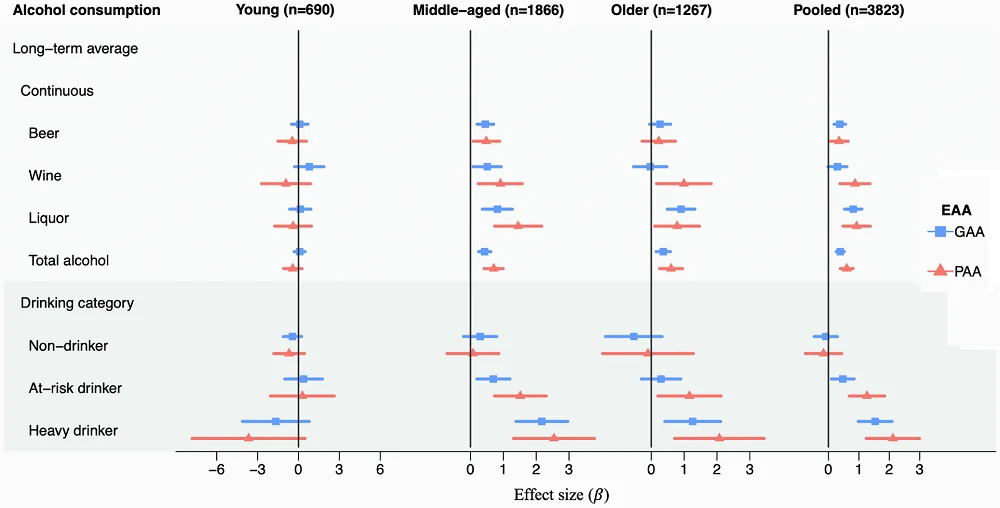A new study has found that higher levels of long-term alcohol consumption are associated with a larger gap between the person’s biological and chronological age, but not in the young [1].
Don’t drink and age
It is common knowledge that excessive drinking can be quite harmful [2], but previous research has suggested a horseshoe-like relationship, with moderate drinking being associated with better health than the two extremes [3]. Newer studies, however, put this conclusion in doubt [4], so even more research has become needed to settle this debate.
Epigenetic clocks appeared around a decade ago and have earned a reputation as a good metric for biological age. In this new study published in Aging, the researchers used two robust second-generation epigenetic clocks, GrimAge and PhenoAge, to assess the impact of drinking on biological age acceleration: the difference between a person’s biological and chronological ages.
Older people drink more
The researchers analyzed drinking patterns of 3823 participants of the Framingham Heart Study. The cohort was stratified by age (young: 24-44 years, middle-aged: 45-64 years, and older: 65-92 years) and average self-reported levels of alcohol consumption over a long period of time. Light drinkers consumed less than 1 drink per day for women and less than 2 drinks per day for men, at-risk drinkers consumed 1-2 drinks per day for women and 2-3 drinks per day for men, and heavy drinkers consumed more than 2 drinks per day for women and more than 3 drinks per day for men.
Interestingly, older people seemed to be more into booze. Only 5.6% of this group were non-drinkers, about twice as few as in the two other groups. Conversely, at-risk drinkers and heavy drinkers were much more prevalent in the older cohort, especially compared to the young cohort (11.8% and 2.3% at-risk drinkers and 5.6% and 0.7% heavy drinkers, respectively).
Hard liquor is the worst
Long-term average alcohol consumption was significantly associated with increased biological age acceleration in middle-aged and old cohorts but not in the young cohort. According to PhenoAge, one additional drink a day increased the discrepancy between biological and chronological age by 0.71 years in middle-aged people and by 0.6 years in older people. GrimAge showed slightly lesser, but still highly statistically significant effects (0.43 and 0.37, years respectively). The model was adjusted for sex, physical activity, educational level, body mass index, smoking, and chronological age.
When the researchers stratified by different types of alcohol, hard liquor emerged as the most harmful type by far, while the second place was hotly contested by beer and wine. According to PhenoAge (here, PAA), wine was more strongly associated with age acceleration in middle-aged participants than beer. For GrimAge (GAA), it was the other way around.

Binge drinking and biological age
White blood cell composition emerged as a potential confounding variable. When adjusted for it, several associations became more robust. In another interesting finding, recent binge drinking showed significant associations with epigenetic age acceleration. Middle-aged participants who reported recent binge drinking (defined as women consuming over 4 drinks per day, men consuming over 5 drinks per day, or less than 2 alcohol-free days per week) had a 0.56-year increase and a 0.93-year increase in epigenetic age acceleration according to GrimAge and PhenoAge, respectively. A recent study showed that stress can cause a transient increase in epigenetic age [5].
This study had several limitations: for instance, it only included European-Americans, so its findings may not be generalizable to other ethnic groups. Participants’ educational level was higher than the national average. Since higher educational levels are associated with better health, this might have mitigated the effect of alcoholic consumption, especially in the young cohort. The researchers note that larger studies might be needed to reveal a true relationship between drinking and epigenetic age acceleration in this age group.
In this study, we explored the association of long-term average alcohol consumption with EAA across the whole adulthood in the 3823 FHS participants. We observed long-term average alcohol consumption (i.e., total alcohol, wine, beer, and liquor consumption) were associated with the increase in GAA and PAA in middle-aged and older participants, while no association were observed among young adults. Additionally, the association between long-term average alcohol consumption and EAA appeared to be linear by comparing associations of non-drinkers, at-risk drinkers, and heavy drinkers with light drinkers as the reference. Furthermore, we found that up to 28% of the association between alcohol consumption (total, beer, or liquor) and hypertension was potentially mediated by GAA and PAA in the pooled sample.
Literature
[1] Wang, M., Li, Y., Lai, M., Nannini, D. R., Hou, L., Joehanes, R., … & Liu, C. (2023). Alcohol consumption and epigenetic age acceleration across human adulthood. Aging, 15.
[2] Room, R., Babor, T., & Rehm, J. (2005). Alcohol and public health. The lancet, 365(9458), 519-530.
[3] Djoussé, L., Biggs, M. L., Mukamal, K. J., & Siscovick, D. S. (2007). Alcohol consumption and type 2 diabetes among older adults: the Cardiovascular Health Study. Obesity, 15(7), 1758-1765.
[4] Zhao, J., Stockwell, T., Naimi, T., Churchill, S., Clay, J., & Sherk, A. (2023). Association Between Daily Alcohol Intake and Risk of All-Cause Mortality: A Systematic Review and Meta-analyses. JAMA Network Open, 6(3), e236185-e236185.
[5] Poganik, J. R., Zhang, B., Baht, G. S., Tyshkovskiy, A., Deik, A., Kerepesi, C., … & Gladyshev, V. N. (2023). Biological age is increased by stress and restored upon recovery. Cell Metabolism, 35(5), 807-820.





